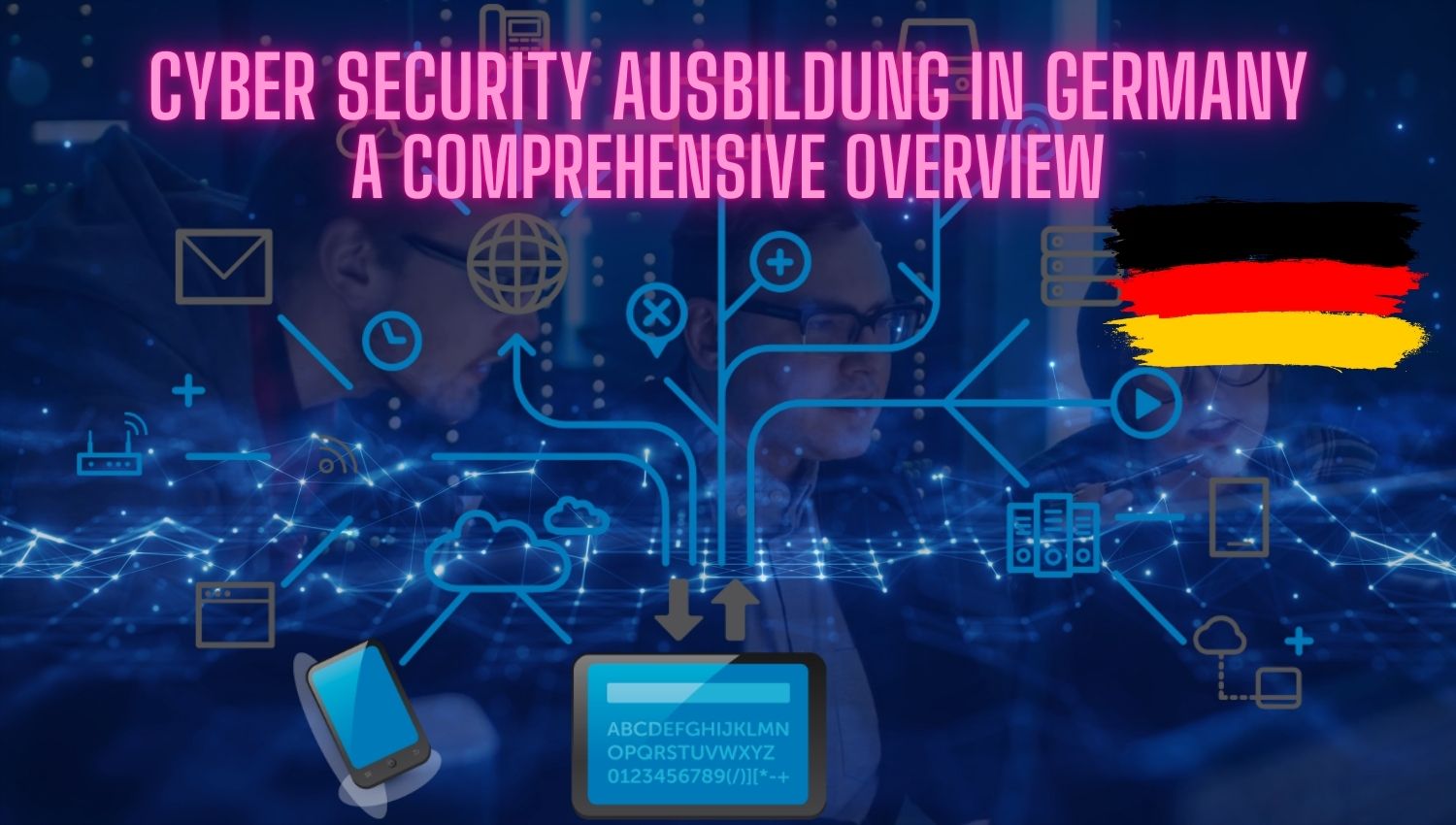Introduction
In today’s hyperconnected world, cyber security is no longer a niche concern but a critical necessity for governments, businesses, and individuals alike. Germany, as one of Europe’s leading economies and a technological powerhouse, is at the forefront of developing robust cyber security measures and training highly skilled professionals to safeguard digital assets. The country’s unique approach to vocational education, known as Ausbildung, alongside its expanding university programs, provides diverse and practical pathways for those aspiring to enter the cyber security field. This article explores the structure, current state, key institutions, curriculum, and future prospects of cyber security training in Germany, with a special focus on programs available in English for international students.
Learning Objectives
- Understand the dual vocational training (Ausbildung) system in Germany as it applies to cyber security
- Explore the current trends and developments in cyber security education across Germany
- Identify the leading institutions and programs offering cyber security training
- Analyze the structure and content of cyber security curricula in both vocational and academic settings
- Provide insights into career opportunities and the future outlook for cyber security professionals in Germany
Cyber Security Ausbildung in Germany
The German Ausbildung system is renowned for its dual approach, blending practical work experience in a real company with theoretical instruction at a vocational school (Berufsschule). In the field of IT, the most relevant Ausbildung is the IT Specialist (Fachinformatiker) program, which now offers several specializations, including Digital Networking and Data and Process Analysis. These specializations increasingly integrate cyber security topics, reflecting the growing importance of digital safety in every sector. A typical Ausbildung lasts three years. During this period, trainees spend most of their week working for a partner company, where they gain hands-on experience in configuring networks, managing IT systems, and implementing security protocols. The remaining time is dedicated to classroom learning, where students cover foundational and advanced topics in IT and cyber security. This combination ensures that graduates are not only knowledgeable but also immediately employable, having already adapted to the workplace environment.
One of the key advantages of the Ausbildung system is that trainees receive a monthly salary, which increases each year. This makes it an attractive option for both German and international students who wish to gain practical skills without incurring significant educational debt.
The Current State of Cyber Security Education in Germany
Cyber security education in Germany is undergoing rapid evolution to keep pace with the dynamic threat landscape. While the traditional Ausbildung remains a cornerstone, there is a clear trend toward more specialized and advanced programs. Many universities now offer bachelor’s and master’s degrees in cyber security, some of which are taught entirely in English to attract international talent. For example, Saarland University’s B.Sc. in Cybersecurity is a fully English-taught program that combines computer science fundamentals with specialized courses in cryptography, network security, and digital forensics. These academic programs often collaborate with leading research institutes, such as the CISPA Helmholtz Center for Information Security, providing students with access to cutting-edge research and practical projects.
The job market for cyber security professionals in Germany is exceptionally strong. Both the private and public sectors are seeking experts to protect critical infrastructure, manage risk, and respond to incidents. The integration of cyber security modules into both vocational and academic programs ensures that graduates are well-prepared for the technical and regulatory demands of the industry.

Key Institutions Offering Cyber Security Training
Germany is home to a variety of respected institutions that provide high-quality cyber security education and training, blending academic excellence with practical experience.
- Saarland University: Renowned for its English-taught B.Sc. in Cybersecurity, Saarland University collaborates closely with the CISPA Helmholtz Center, giving students access to cutting-edge research and hands-on projects in information security.
- Federal Office for Information Security (BSI): As the nation’s central IT security authority, BSI offers specialized training, workshops, and practical exercises for both public and private sector professionals. It also works with vocational schools and companies to develop current, industry-relevant curricula.
- BWI (Bundeswehr IT Partner): BWI delivers a dual bachelor’s program in cyber security, combining academic study with practical training in the context of Germany’s defense and critical infrastructure sectors.
- Vocational Schools and Partner Companies: Across Germany, many vocational schools and companies offer the IT Specialist (Fachinformatiker) Ausbildung with a focus on cyber security, digital networking, or system integration. These programs emphasize both theoretical learning and real-world application.
- Technical University of Munich, RWTH Aachen, and Others: Leading technical universities provide a range of English-taught or bilingual cyber security programs, often featuring strong industry links, internships, and research opportunities.
Together, these institutions ensure that cyber security students in Germany receive a balanced education, combining theoretical foundations, practical skills, and exposure to the latest developments in the field.
Program Structure and Content
Cyber security Ausbildung and academic programs in Germany are meticulously designed to provide a well-rounded and in-depth education that effectively balances theoretical knowledge with practical skills. This dual focus ensures that graduates are not only familiar with the foundational and advanced concepts of cyber security but are also adept at applying their knowledge in real-world scenarios, making them highly sought after in the job market.
Vocational Training (Ausbildung):
- Practical Training: The core of the Ausbildung model is its emphasis on hands-on experience. Apprentices are embedded within IT departments of companies, security operations centers, or even governmental and research institutions. Here, they are exposed to the day-to-day challenges of maintaining secure IT infrastructures. Tasks often include configuring and managing firewalls, monitoring network traffic for anomalies, setting up intrusion detection systems, managing user permissions, and responding to real security incidents. This exposure allows trainees to develop troubleshooting skills, understand the workflow of security teams, and gain confidence in operating within professional environments. In some cases, apprentices may rotate through different departments, gaining a broader perspective on various facets of IT and cyber security.
- Classroom Education: The theoretical component is delivered at vocational schools (Berufsschule), where students typically spend one or two days per week. The curriculum is comprehensive and covers:
- IT Systems and Network Architecture: Understanding the building blocks of modern IT environments, including hardware, software, and network protocols.
- Programming and Software Development: Learning programming languages such as Python, Java, or C++, which are essential for understanding vulnerabilities and creating secure applications.
- Data Privacy, GDPR, and Compliance: Studying legal frameworks, especially the European Union’s General Data Protection Regulation (GDPR), and how to implement compliant data protection measures.
- Cyber Security Fundamentals, Risk Assessment, and Management: Gaining knowledge of threat landscapes, risk analysis methodologies, and best practices for securing digital assets.
- Cryptography and Digital Forensics: Exploring encryption techniques, secure communication protocols, and methods for investigating and analyzing cyber incidents.
- Emerging Technologies: Some programs introduce topics like cloud security, IoT security, and mobile device management, reflecting current trends in the industry.
- Project Work: In addition to regular coursework, apprentices are often required to complete individual or group projects that simulate real-world challenges. These projects might involve developing and enforcing security policies, conducting penetration tests, performing vulnerability assessments, or participating in cyber-attack simulations. Such experiences foster teamwork, critical thinking, and the ability to apply theoretical knowledge in practical situations.
- Soft Skills Development: Many Ausbildung programs also emphasize the development of soft skills, such as communication, project management, teamwork, and ethical decision-making, which are crucial for a successful career in cyber security.
- Certification: Upon successful completion of the program, apprentices receive a state-recognized vocational qualification (Berufsabschluss), which is highly respected by employers across Germany. This certification demonstrates both technical competence and practical experience, giving graduates a competitive edge in the job market.
University Programs:
- Core Courses: University-based cyber security programs begin with foundational courses in mathematics, computer science, and programming. These are essential for building analytical and problem-solving skills. Specialized courses delve into topics such as cryptography, secure software engineering, network security, ethical hacking, and threat intelligence.
- Advanced Modules:As students progress, they can choose from a variety of advanced modules tailored to their interests and career goals. These may include:
- Artificial Intelligence and Machine Learning in Security: Understanding how AI can be used for threat detection, anomaly analysis, and automated response systems.
- Quantum Computing and Post-Quantum Cryptography: Exploring the future of encryption and how emerging technologies might impact security protocols.
- Penetration Testing and Vulnerability Assessment: Learning how to identify and exploit weaknesses in systems to improve overall security.
- Digital Forensics: Investigating cyber crimes, collecting digital evidence, and understanding legal aspects of cyber investigations.
- Cloud and IoT Security: Addressing the unique challenges posed by cloud computing environments and the proliferation of connected devices.
- Research and Labs: University programs place a strong emphasis on research and hands-on laboratory work. Students participate in practical exercises, simulations, and research projects, often in collaboration with industry partners or leading research centers like CISPA. These experiences help bridge the gap between academic theory and industry practice.
- Internships and Industry Collaboration: Many programs include mandatory or recommended internships, allowing students to gain direct experience in the field, build professional networks, and enhance their employability. Universities often have partnerships with tech companies, government agencies, and research institutions, providing students with access to cutting-edge projects and real-world challenges.
- Thesis and Capstone Projects: The culmination of most bachelor’s and master’s programs is a thesis or capstone project. This requires students to conduct independent research or solve a complex problem in cyber security, demonstrating their ability to integrate and apply their knowledge.
- Language of Instruction and International Focus: Recognizing the global nature of cyber security, many German universities offer their programs in English, especially at the master’s level. This attracts a diverse student body and prepares graduates for careers in international environments.
- Continuous Learning and Professional Development: Given the fast-evolving nature of cyber threats, both vocational and academic programs encourage a mindset of lifelong learning. Graduates are often encouraged to pursue further certifications (such as CISSP, CEH, or CompTIA Security+) and to stay updated with the latest developments in the field.
Conclusion
Germany’s cyber security Ausbildung and academic programs offer multiple, flexible pathways for those seeking a career in this vital field. The dual vocational training system ensures that students gain not only theoretical knowledge but also invaluable practical experience, making them highly attractive to employers. English-taught university programs further open the doors for international students, providing world-class education and research opportunities. With its strong emphasis on technological innovation, data protection, and practical training, Germany is an ideal destination for aspiring cyber security professionals. As cyber threats continue to evolve, the need for skilled experts will only grow, ensuring excellent career prospects for graduates of these programs. Whether through the hands-on Ausbildung route or advanced university degrees, Germany’s educational landscape is well-equipped to meet the challenges of the digital age and to shape the future of global cyber security.


What are the chances of making ausbildung for IT from Brazil to Germany, can you give detailed information?
Sorry, I don’t know enough about this.
You can check the links I left as references
Please write in the comments about the age, education level, country of the people who want to get support
I am 27 years old and I am not a university graduate, but I have been working in a computer repair office for a while.
I’m from morroco, 25 years old, And I’m a culinary graduate